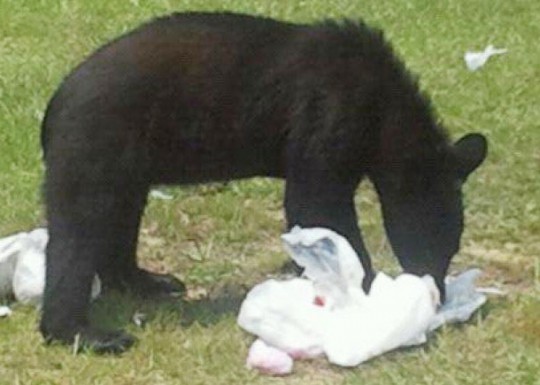Bear, Gator Feeding Won’t Go To Dogs
April 22, 2015
Florida lawmakers are taking aim at people caught repeatedly feeding bears and alligators, as the state prepares to allow its first black bear hunt in two decades.
But House members Tuesday rejected a proposal that would have prohibited the use of dogs for the bear hunts, a practice known as “bear hounding.” Though lawmakers declined to approve the idea, wildlife officials are expected to bar the use of canines in the hunts.
 The House on Tuesday advanced a measure (HB 7021) that would increase penalties for people charged a fourth time with feeding bears and alligator not in captivity.
The House on Tuesday advanced a measure (HB 7021) that would increase penalties for people charged a fourth time with feeding bears and alligator not in captivity.
The charge would be a third-degree felony and carry a fine of up to $5,000 and the chance of spending up to five years in jail.
Currently, a fourth offense of illegally feeding wildlife within a 10-year period is a first-degree misdemeanor, which carries a minimum fine of $750, the chance for up to a year in jail and a three-year suspension of any recreational license.
A final vote on the House bill is expected Wednesday. The Senate is expected Thursday to review a similar proposal (SB 680).
The legislative proposal is backed by the Fish and Wildlife Conservation Commission as a means to address dangerous interactions between humans and wildlife.
The commission is expected in June to give formal approval for a black bear hunt, which could start Oct. 24 and last up to a week.
In advancing the feeding-ban proposal, the House rejected, in a voice vote, an amendment that would have prohibited the use of radio-collared dogs to pursue bears on the hunts.
“This doesn’t prevent bear hunting. What it does is sets some limitations on the use of dogs,” Rep. Jared Moskowitz, D-Coral Springs, said of his proposed amendment. Fish and Wildlife is “not going to pass that final rule until June. And since I’ve heard this chamber on many other subjects not wanting to let bureaucrats make law, and they want legislators to make law, that’s why I brought this amendment.”
The Fish and Wildlife proposal prohibits the use of dogs to hunt bear, but allows leashed canines to trail shot bears.
Rep. Katie Edwards, D-Plantation, said sportsmen in states where bear hunting is legal typically don’t use dogs.
“They’re up in tree stands, and that’s the way they’re able to hunt bear,” Edwards said.
The Fish and Wildlife Conservation Commission is backing bear hunts because of a growing number of bear and human conflicts across the state. The one-bear-per-hunter hunt would be held in four regions — the eastern Panhandle, Northeast Florida, east-central Florida and South Florida — where there are an estimated 2,500 black bears.
Black bears were placed on Florida’s threatened list in 1974, when there were between 300 and 500 in the state. At the time, hunting black bear was limited to three counties. In 1994, the hunting season was closed statewide.
The legislative measure would seek to make sure more people know they are violating state laws on illegal feeding. In doing so, it would lessen the fines for people caught the first time illegally slipping food to bears and gators, along with foxes, raccoons, sandhill cranes, pelicans, and bald eagles.
Currently, the state imposes a second-degree misdemeanor charge on first-time offenders, which carries a penalty of up to $500 and up to 60 days in jail. However, wildlife officials are now “generally hesitant to issue a criminal citation to a first time offender,” according to a House staff analysis.
Under the proposal, first-time offenders would receive non-criminal tickets, carrying a $100 fine.
The belief from the Fish and Wildlife agency is that by removing the stricter penalty for first-time offenders, there will be less chance those people will repeat as they learn the rules.
“Once issued a civil penalty, first-time offenders should better understand the serious nature of violating the feeding rules,” the analysis said. “Therefore, these individuals will be less likely to incur criminal violations for future violations.”
A second-degree misdemeanor charge would kick in for people caught a second time. Those caught feeding bears and gators a third time would receive a first-degree misdemeanor, while additional violations involving foxes, raccoons, sandhill cranes, pelicans, and bald eagles would remain a second-degree offense.
by Jim Turner, The News Service of Florida
Comments
2 Responses to “Bear, Gator Feeding Won’t Go To Dogs”



I agree with EMS.
If the feeding stops, the bears will stop looking to humans for food, so why kill them?
Has anyone in this area been killed by a bear?